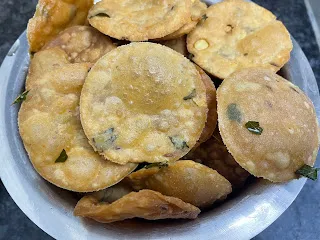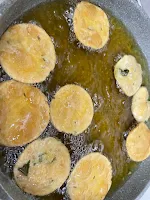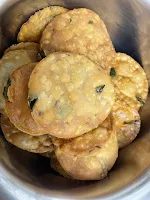Chekkalu with Wheat Flour | Snacks with Wheat Flour | Crispy Snacks with Wheat Flour | Quick Tea Time Snack with Wheat Flour | Tasty and Crispy Wheat Flour Chips | Easy Wheat Flour Snack Recipe | Low Ingredient Wheat Flour Snack | Wheat Flour Appadalu Recipe | Wheat Flour Tattai Recipe | Wheat Flour Chekkalu Ingredients
Homemade Crispy Indian Chips (Chakkalu/Chakkilalu)
- Preparation Time: 20 minutes
- Cooking Time: 30 minutes
- Total Time: 50 minutes
- Servings: Makes approximately 4 cups of chips
1. Introduction:
Homemade Crispy Indian
Chips, known as Chakkalu or Chakkilalu in South India, are a beloved snack
cherished for their crunchy texture and aromatic spices. These crispy delights
are not just a treat for the taste buds but also a cultural staple, often
enjoyed during festivals, tea-time, and social gatherings. Made from simple
ingredients like wheat flour, spices, and optionally Bengal Gram (Chana Dal),
these chips offer a homemade goodness that is unmatched by store-bought
alternatives.
2. History:
The History of Chakkalu
traces back to ancient times when simple ingredients were transformed into
flavorful snacks using traditional cooking techniques. While specific
historical documentation may be sparse, the evolution of Chakkalu can be
understood through the broader context of Indian culinary heritage.
1. Traditional
Techniques: Historically, Chakkalu were handmade using basic utensils and
tools available in households. The dough was rolled out thinly and then
deep-fried in hot oil until golden brown and crispy. This method not only
preserved the ingredients but also enhanced their flavors.
2. Ingredients and
Adaptations: Over time, Chakkalu recipes have evolved to incorporate
regional spices and ingredients. While wheat flour remains a staple, additions
such as Bengal Gram (Chana Dal), cumin seeds, and fresh herbs like coriander
and curry leaves have been incorporated to enhance flavor profiles.
3. Symbolism and Cultural
Continuity: The preparation and sharing of Chakkalu symbolize cultural
continuity and familial bonds. Recipes are often passed down orally from one
generation to the next, preserving culinary traditions and ensuring that these
snacks remain an integral part of cultural celebrations.
4. Modern Influence: In
contemporary times, Chakkalu recipes have adapted to meet modern tasted and
preferences. While the traditional method of deep-frying remains prevalent,
there are also healthier variations that use baking or air-frying techniques, reflecting
changing dietary habits.
5. Global Influence: With the
globalization of Indian cuisine, Chakkalu have gained popularity beyond South
India, becoming a favorite snack in Indian restaurants worldwide. Their crispy
texture and rich flavors continue to captivate food enthusiasts of diverse
cultural backgrounds.
3. Cultural Significance:
Homemade Crispy Indian
Chips, known as Chakkalu or Chakkilalu, hold a significant place in South
Indian culinary traditions and culture. These crispy snacks are not merely a
food item but represent a heritage that spans generations, passed down through
families and cherished during festive occasions and everyday gatherings.
1. Festival Celebrations:
- Diwali: Diwali,
the Festival of Lights, holds special significance for Chakkalu. Families
gather to celebrate the triumph of light over darkness by exchanging sweets and
savory snacks, including these crispy chips. The preparation of Chakkalu during
Diwali symbolizes prosperity and abundance, making them an integral part of
festival spread.
2. Tea-Time Rituals:
- In South Indian
households, Chakkalu are often enjoyed with a steaming cup of filter coffer or
masala chai during evening tea-time. This ritual not only satisfies hunger but
also offers a moment of relaxation and social bonding.
3. Social Gatherings:
- Whether it’s a family
reunion, a wedding celebration, or a religious ceremony. Chakkalu are served as
a welcoming gesture to guests. Their crispy texture and flavorful spices make
them a versatile snack that complements various occasions.
4. Regional
Variations: While Chakkalu are primarily associated with South India, each
region and community may have its own variations in terms of ingredients and
preparation methods. This diversity adds richness to the cultural tapestry of
Indian cuisine.
4. Importance of
Ingredients:
- Wheat Flour: Forms
the base of the dough, providing structure and a neutral flavor that
complements the spices.
- Bengal Gram (Chana Dal): Adds
a nutty crunch and protein content, enhancing both texture and nutritional
value.
- Spices (Salt, Red Chili
Powder, Cumin Seeds, and Turmeric): Infuse the chips with
flavors ranging from subtle heat to earthy warmth.
- Fresh Coriander Leaves
and Curry Leaves: Offer fresh herbal notes that elevate the overall taste
profile of the chips.
- Hot Oil: Incorporates
into the dough to create a crispy texture and aids in binding the ingredients
together.
5. Occasions and Who Can
Enjoy It:
Homemade Crispy Indian
Chips are versatile and suitable for various occasions:
- Festivals: Such
as Diwali, where they are made in abundance and shared among family and friends
as a symbol of celebration.
- Tea-Time Snack: Enjoyed
with a hot beverage, providing a satisfying crunch and a burst of flavor.
- Social Gatherings: Serve
as a delightful appetizer or complement to other snacks, pleasing guests of all
ages.
- Children and Adults: Loved
universally for their crispy texture and savory taste, appealing to diverse
palates.
6. Benefits and Uses of
Having This Recipe:
- Homemade Goodness: Control
over ingredients ensures freshness and quality, offering a healthier
alternative to commercially processed snacks.
- Customizable: Adjust
spice levels and ingredients to suit personal preferences, accommodating
dietary restrictions and flavor preferences.
- Long Shelf Life: Properly
stored, these chips can be enjoyed for up to a month, making them ideal for
make-ahead snacks and gifting.
7. Ingredients:
- 2
cups Wheat Flour
- Salt,
to taste
- 1
tsp Red Chili Powder
- 1
tsp Cumin Seeds
- Fresh
Coriander Leaves, finely chopped
- Fresh
Curry Leaves, finely chopped
- 1
tsp Turmeric Powder
- 3
tbsp. Hot Oil
- Oil
for deep frying
- 2
tsp Rice Flour or additional Wheat Flour (for dusting)
- 1
cup Bengal Gram (Chana Dal), soaked for 4 hours
8. Detailed Cooking
Instructions:
1. Prepare
Bengal Gram (Chana Dal):
- Rinse 1 cup
of Bengal Gram (Chana Dal) under cold water and soak it in fresh water for at
least 4 hours, or overnight.
2. Prepare
the Dough:
- In a large
mixing bowl, combine 2 cups of Wheat Flour with salt to taste, 1 tsp Red Chili
Powder, 1 tsp Cumin Seeds, finely chopped Fresh Coriander Leaves, finely
chopped Curry Leaves, 1 tsp Turmeric Powder, and 3 tbsp. of Hot Oil.
- Drain the
soaked Bengal Gram (Chana Dal) and add it to the flour mixture.
- Gradually
add water while kneading to form a soft and pliable dough. Cover the dough and
let it rest for 5 minutes.
3. Shape
the Chips:
- Pinch off
small portions of the dough and roll them into balls.
- Dust each
ball with a little Rice Flour or additional Wheat Flour to prevent sticking.
- Roll out
each ball into a thin, flat sheet using a rolling pin. Aim for a thickness
similar to a paper sheet.
4. Cut
into Rounds:
- Use a round
cookie cutter or a small glass to cut out rounds from the rolled dough sheets.
Gather the scraps of dough and reuse them to make more rounds.
5. Fry
the Chips:
- Heat oil in
a deep frying pan or kadai over medium heat.
- Once the oil
is hot, carefully slide in the rounds of dough in batches. Fry them until they
turn golden brown and crispy. Ensure the oil is not too hot to prevent burning.
- Remove the
fried chips using a slotted spoon and drain excess oil on paper towels.
6. Storage:
- Allow the
chips to cool completely before storing them in an airtight container. They can
be stored for up to a month.
- Serve these
crispy chips as a snack or accompaniment with tea or coffee.
9. Health Benefits and
Uses:
- Moderation: While
these chips are deep-fried, they can be enjoyed in moderation as part of a
balanced diet.
- Nutrient Content: Bengal
Gram (Chana Dal) adds protein and fiber, while spices like Turmeric offer
antioxidant and anti-inflammatory properties.
- Versatile Snack: Serve
as a standalone snack or pair with dips and chutneys for added variety.
10. Cooking Tips and
Variations:
- Crispiness Tip: Adding
Rice Flour while rolling out the dough sheets enhances the crispiness of the
chips. If Rice Flour is unavailable, use a bit more Wheat Flour instead.
- Variation without Bengal
Gram: Omitting Bengal Gram (Chana Dal) results in a lighter
texture. The process remains the same, yielding crispy chips/sticks (Chakkalu).
- Adjusting Thickness: Customize
the thickness of the dough sheets to achieve desired crispiness. Thinner sheets
will result in crispier chips.
- Frying Temperature: Fry
the chips over medium heat to ensure even cooking and prevent burning,
resulting in uniformly crispy chips.
- Optionally, if you prefer
a quicker process or wish to avoid Bengal Gram (Chana Dal), you can omit it
from the recipe. The remaining process remains the same, and you can still
achieve crispy Chekkalu by adjusting frying time and heat level.
- Children’s Favorite: These
homemade chips are sure to be a hit with kids due to their crispy texture and
savory flavor
By following these detailed
steps and tips, you can easily recreate these delicious homemade crispy Indian
chips (Chakkalu/Chakkilalu) at home. Enjoy them as a snack or serve them during
gatherings for a delightful treat!
11. Nutritional
Information:
*(Approximate values per
serving)*
- Calories: 300 kcal
- Carbohydrates: 40 g
- Protein: 8 g
- Fat: 12 g
- Fiber: 6 g
- Sodium: 300 mg
12. Presentation and
Serving:
- Arrange these homemade
crispy Indian chips (Chakkalu/Chakkilalu) on a serving platter lined with a
decorative napkin or banana leaf for an authentic touch.
- Serve alongside a variety
of chutneys, dips, or enjoy them with a hot cup of masala chai for a delightful
snack experience.
Conclusion:















Comments
Post a Comment